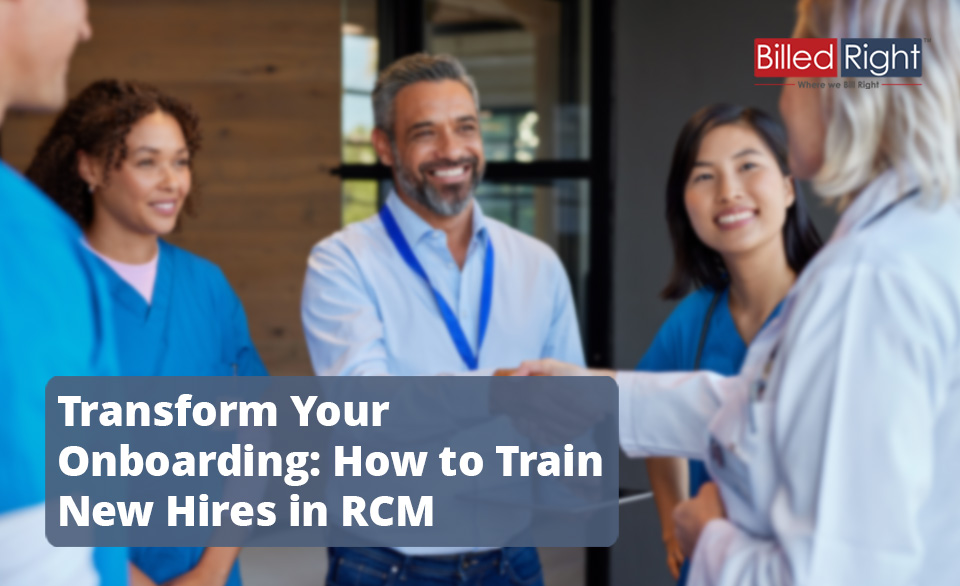Transform Your Onboarding: How to Train New Hires in RCM

Building a Strong Foundation: Onboarding New Hires in RCM
Importance of Effective Onboarding
Effective onboarding is crucial for integrating new hires into Revenue Cycle Management (RCM) processes. A strong onboarding program sets the stage for success by equipping your new staff with the necessary knowledge and skills. Ensuring that new team members understand their roles can significantly reduce turnover rates and enhance job satisfaction.
Research shows various benefits tied to effective onboarding, including:
| Benefit | Description |
|---|---|
| Improved Retention Rates | Well-structured onboarding programs can increase employee retention by up to 25%. |
| Better Job Performance | Employees who undergo effective onboarding consistently perform better. |
| Increased Engagement | Engaged employees contribute positively to the workplace culture. |
Key Elements of a Successful Onboarding Program
To create an effective onboarding program, you should focus on several key elements. These components ensure that new hires receive comprehensive training and support.
| Element | Description |
|---|---|
| Clear Orientation | Provide an overview of the company’s mission, values, and RCM workflows. This helps new hires understand how their roles contribute to larger organizational goals. |
| Structured Training Schedule | Develop a timeline for training activities, incorporating essential topics and hands-on practice. For insights on structuring RCM training, refer to developing a rcm training program. |
| Mentorship Opportunities | Pairing new hires with experienced colleagues fosters learning and support. Explore the significance of mentorship in RCM development here. |
| Regular Feedback | Provide consistent feedback throughout the onboarding process. This encourages growth and helps you identify areas needing improvement. |
| Ongoing Education | Emphasize the value of continuous learning within RCM. For guidance on fostering ongoing education, see ongoing education for rcm staff. |
Incorporate these elements into your onboarding strategy to ensure that new hires feel welcomed and well-prepared to contribute effectively. Understanding the key skills for RCM professionals and enhancing your program accordingly can lead to remarkable improvements in staff performance.
Training Strategies for New Hires in RCM
Understanding the principles and practices of Revenue Cycle Management (RCM) is essential for new hires in the healthcare sector. Implementing effective training strategies ensures that team members are well-equipped to contribute to the financial health of your medical practice.
Introduction to Revenue Cycle Management
The first step in training new hires is to provide a solid introduction to RCM. This foundational knowledge includes an overview of the entire revenue cycle, key processes, and how each role impacts overall financial performance.
Consider utilizing a structured curriculum that covers:
| Learning Topic | Description |
|---|---|
| Definition of RCM | An overview of what RCM entails, emphasizing its importance in healthcare operations. |
| Key Components | Breakdown of the revenue cycle processes like registration, billing, and collections. |
| Workflow Understanding | How various departments work together throughout the RCM process. |
Offering resources such as importance of rcm staff training and practical case studies can enhance the learning experience.
Hands-On Practice and Simulation Exercises
Hands-on training is critical in RCM, as it allows new hires to apply theoretical knowledge in real-world scenarios. Implementing simulation exercises provides a safe space for them to practice their skills without any repercussions.
You can structure this training through:
| Exercise Type | Details |
|---|---|
| Scenario-Based Simulations | Create scenarios that simulate real-life situations in medical billing and collections. |
| Role-Playing | Have new hires role-play different positions within the revenue cycle, allowing them to understand various responsibilities. |
| Software Practice | Use RCM software for practical exercises, such as inputting charge data and generating invoices. Refer to training on rcm software and tools for further specifics. |
Incorporating training for medical billing and coding within these exercises can also help new team members gain specific skills relevant to their roles.
Ongoing Education and Support for Continued Growth
The training does not stop after the initial onboarding phase. By fostering a culture of ongoing education, you can ensure that your staff continues to develop their skills, keeping pace with industry changes and new technologies.
Implement a structured plan for continuous learning that includes:
| Educational Component | Purpose |
|---|---|
| Workshops and Seminars | Regular sessions on current trends and best practices in RCM, including best practices for staff development in rcm. |
| Credentialing and Certification | Encourage staff to pursue certifications to enhance their professional credentials, exploring rcm certification programs to consider. |
| Mentorship Programs | Pair new hires with experienced staff or mentors to provide guidance and support through their learning journey. For insights on building mentorship, refer to the role of mentorship in rcm development. |
By combining initial training with ongoing support and education, you contribute significantly to the professional development of your staff. This approach promotes a more competent workforce, ready to meet the challenges of Revenue Cycle Management effectively.







